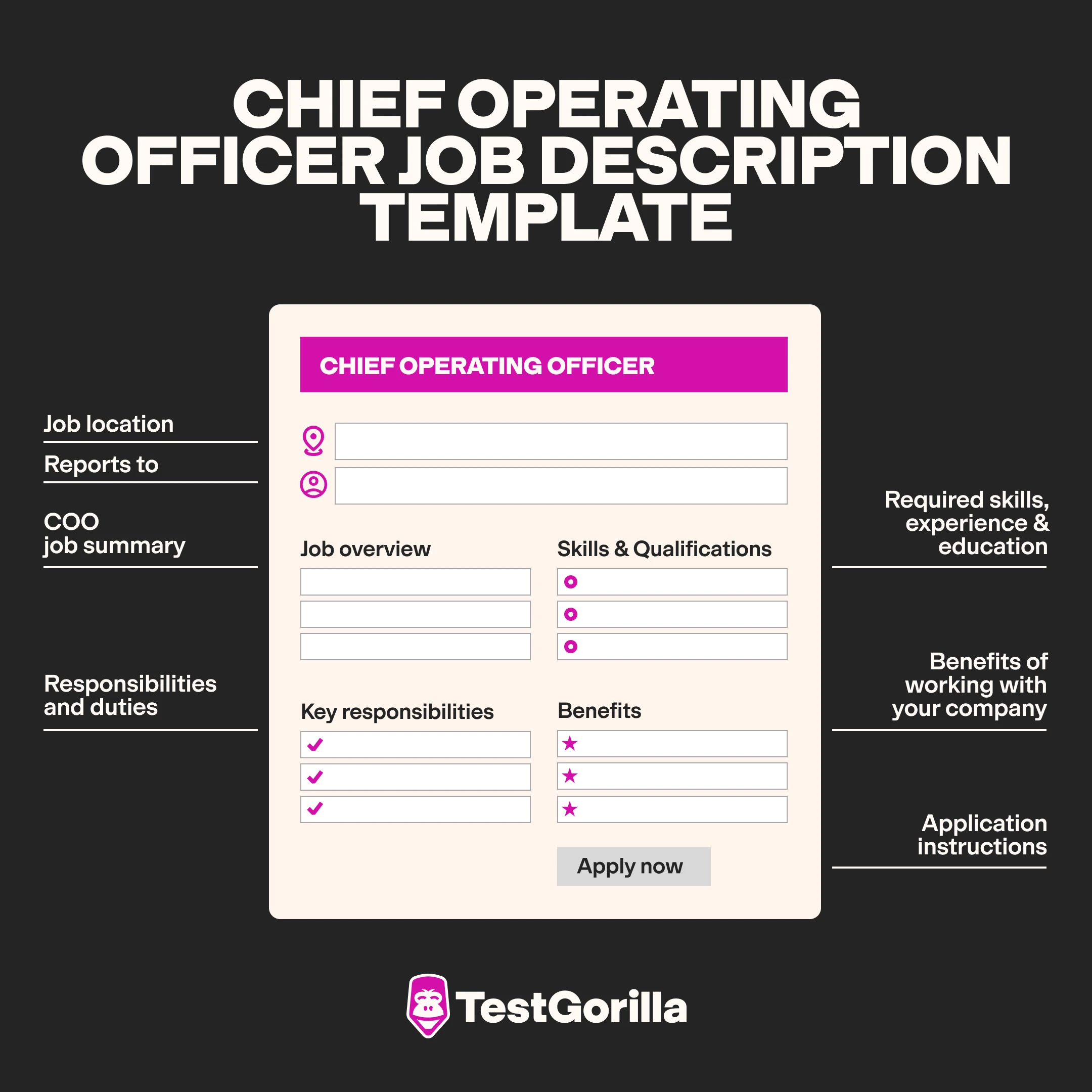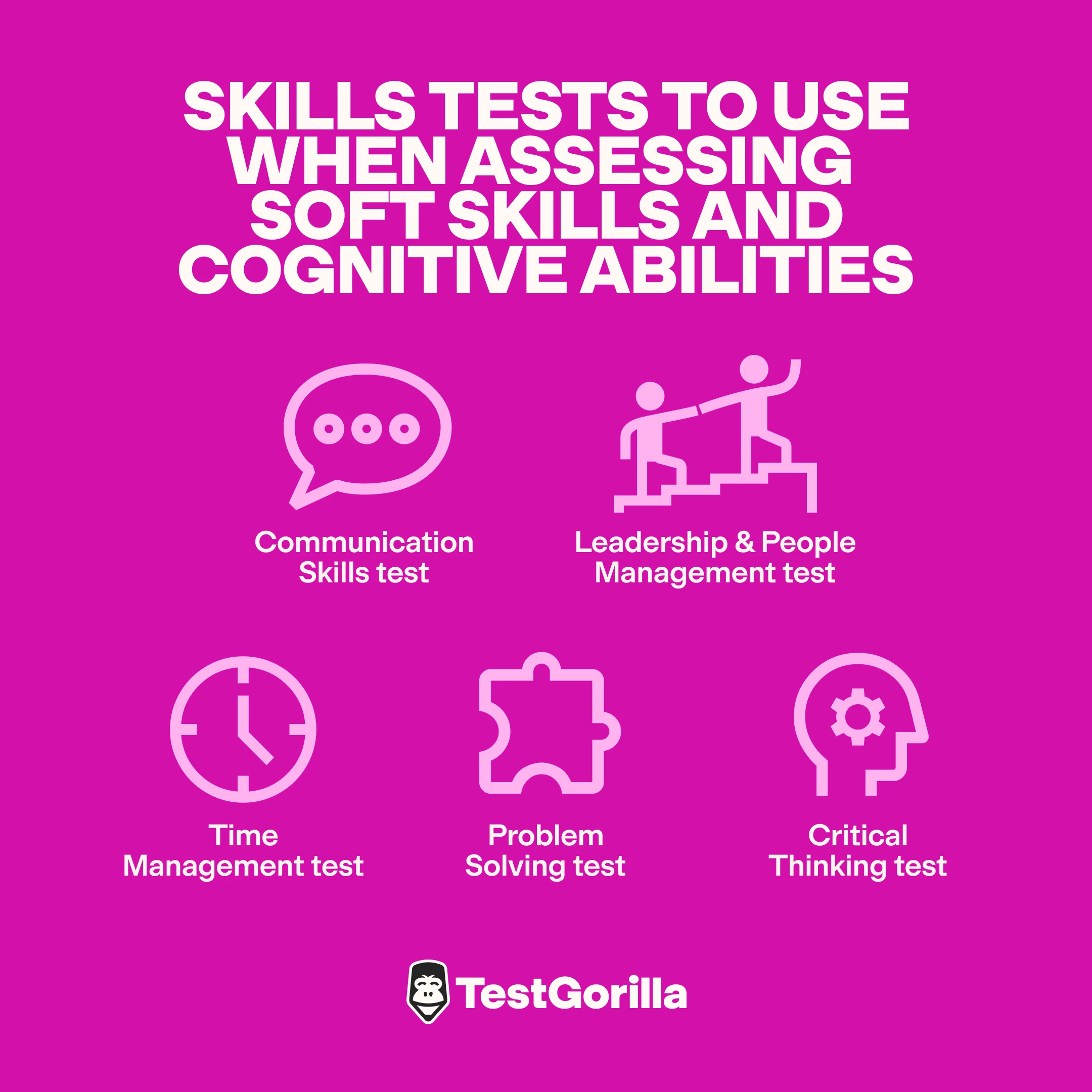A good chief operating officer (COO) is crucial to your company’s success. They run your operations like a well-oiled machine, drive efficiency, and keep the company on track toward its goals.
But writing a job description for this role isn’t easy. It’s tricky to capture the full scope of responsibilities, and getting it wrong can seriously harm operations, profits, and reputation with various stakeholders.
Don’t sweat it, though, because in this guide, we provide a well-thought-out COO job description template that you can use to attract top talent. We also share our best tips on how to assess candidates using skills-based methods so you can hire a solid and reliable COO for your business.
COO job description template
Job Title: Chief Operating Officer (COO)
Location: [Insert Location]
Reports To: Chief Executive Officer (CEO)
Job Overview
We are seeking a dynamic and experienced Chief Operating Officer (COO) to oversee our company’s daily operations and to help drive our business strategy forward. The COO will work closely with the CEO and the leadership team to ensure the company’s strategic goals are achieved through efficient operational management. The ideal candidate will be an operational expert with proven experience in leading teams, optimizing processes, and driving growth.
Key Responsibilities
Collaborate with the CEO to set and implement the company’s strategic vision and long-term operational plans.
Oversee daily operations, ensuring they align with company goals and performance targets.
Drive the company’s operational efficiency by identifying areas for process improvement and implementing best practices.
Manage key departments including finance, human resources, IT, legal, and facilities management.
Develop and control operational budgets, ensuring resources are used efficiently while maintaining financial stability.
Lead and develop high-performing teams across various functions, fostering a culture of accountability, performance, and growth.
Build and maintain strong relationships with clients, partners, and key stakeholders.
Monitor operational performance using data and key metrics, providing regular updates and forecasts to the executive team.
Ensure compliance with regulatory requirements and industry standards.
Partner with other C-level executives to achieve short- and long-term organizational goals.
Required Skills
Proven experience in an executive leadership role, ideally within [specific industry].
Strong leadership skills with the ability to inspire and motivate teams.
In-depth understanding of business operations, financial management, and strategic planning.
Proficient in data analysis and performance metrics.
Excellent communication and interpersonal skills.
Strong problem-solving abilities with the capability to foresee challenges and implement effective solutions.
Ability to drive change and manage growth within a fast-paced environment.
Preferred Experience and Education
Bachelor’s degree in business, finance, or a related field; MBA or advanced degree strongly preferred.
A minimum of 10 years of management experience, with at least 5 years in a senior leadership position.
Experience in capital management, fundraising, or international business operations is a plus.
Benefits
[List of benefits, such as stock options, performance bonuses, paid leave, etc.]
Opportunities for professional growth and career advancement within the company.
Collaborative and inclusive work culture that encourages innovation and excellence.
Application Instructions
If you are a strategic thinker with a passion for operational excellence and leadership, we invite you to apply for this role. Please submit your application materials, such as a resume and cover letter to [email address] by [application deadline]. We look forward to learning more about your experience and vision for our company’s future.
Why this COO job description template works
We crafted this job description to attract high-caliber COO candidates who can drive operational success and manage your full ops department. A quick job overview sets the stage for candidates by highlighting key details about the role, who the COO will work with, and how they'll contribute to the company's mission.
We’ve also listed just the essential responsibilities for the role. This helps candidates know what to expect without overly dictating how they should do their job as a company leader.
While we’ve specified years of experience and degrees, we’ve labeled these as “preferred” rather than essential. This is because we prioritize skills instead, which opens the door to a wider range of skilled candidates and ensures that those who can make an immediate impact are drawn to the role.
Finally, the job description concludes with compelling reasons that your company is the best choice. It also includes straightforward application instructions to make it easy for applicants to take the next step.
The best insights on HR and recruitment, delivered to your inbox.
Biweekly updates. No spam. Unsubscribe any time.
Next steps: Attracting and assessing COO candidates
A clear, concise job description is a great first step to drawing in high-quality candidates. But with such a high-stakes role, you'll need to find a way to thoroughly assess each applicant on everything from technical expertise to leadership skills.
TestGorilla's talent assessments are the best way to do this. We have a library of 400+ science-backed assessments to examine candidates on every aspect of the COO role. You can add up to five tests to create a custom assessment for your COO position. Here are some tests we recommend:
Job-specific
Soft skills and cognitive abilities
Personality and culture
DISC test, Enneagram, and other personality tests
These tests accurately measure candidates' capabilities when hiring a chief operating officer. In addition to hard and soft skills, they provide insight into your candidate's personality traits and cultural contributions – both critical in a C-suite role.
Finally, using the same COO tests for all applicants ensures a fair process and helps to improve diversity at the leadership level.
Start hiring better with TestGorilla. Sign up for a free account or schedule a live demo today.
FAQs
Looking for more information? Explore our answers to some frequently asked questions.
What is a COO vs CEO?
A CEO (chief executive officer) leads the entire company. They set and drive the overall mission and make top-level decisions. A COO (chief operating officer) focuses on day-to-day operations, ensuring everything runs smoothly according to the CEO's vision. Think about it this way – the CEO sets the course, and the COO makes sure the ship stays on that course.
Thinking about hiring a new CEO for your company? Read our complete guide on hiring a CEO.
Is COO higher than CFO?
Typically, a COO is more senior than the CFO (chief financial officer). While the CFO manages the company’s finances, the COO oversees overall operations and has broader responsibilities depending on the company’s structure.
Need a CFO to manage your company's finances? Check out our blog on how to hire a CFO.
What questions should I ask a COO?
You can ask your COO candidates behavioral and situational interview questions. Focus on their experience in improving operations, their leadership style, how they handle challenges, and how they align day-to-day operations with long-term goals.
Wondering what questions to ask your COO applicants? Here are 20 top management interview questions to inspire you.
Related posts
You've scrolled this far
Why not try TestGorilla for free, and see what happens when you put skills first.
















